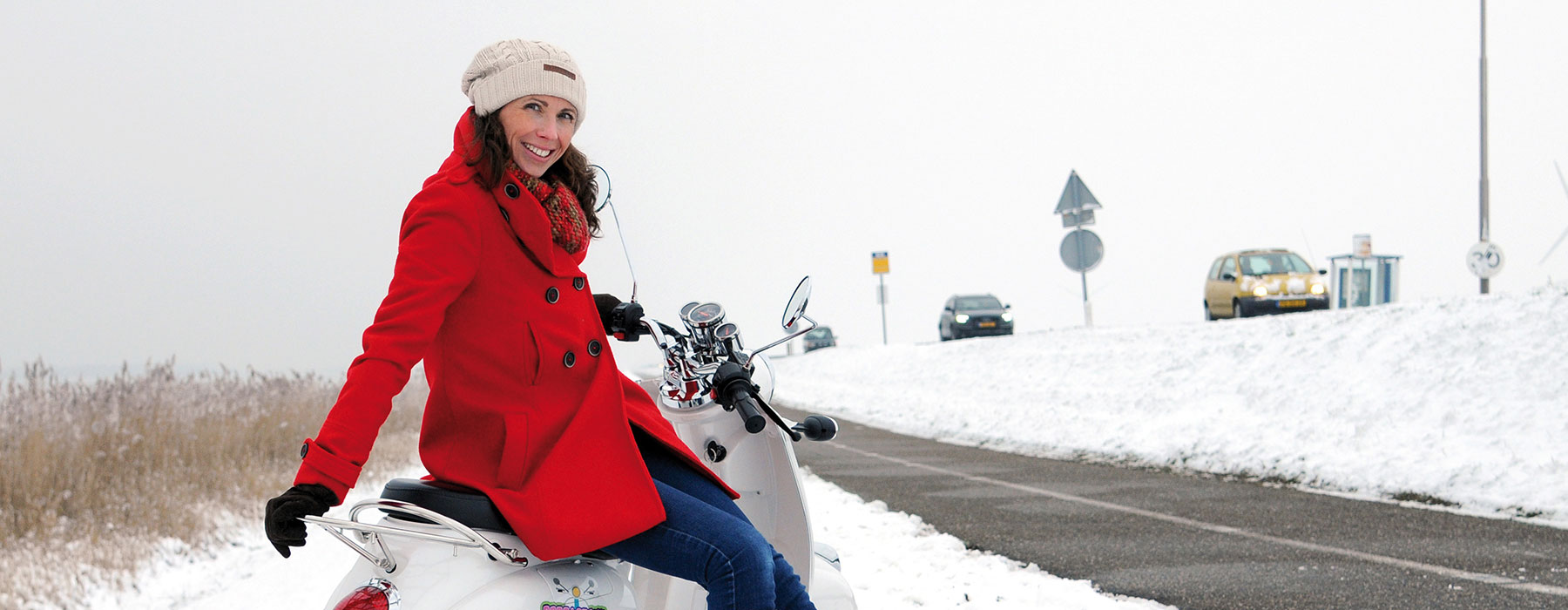NAME: STEPHANIE DE PELSMAEKER
COMPANY: SCOOTERFUN ZEEWOLDE
IN THE NETHERLANDS SINCE: 2011
‘If you’ve worked in Angola, you can work anywhere’, says the Flemish Stephanie de Pelsmaeker. Everything is difficult in Angola: papers, stamps, rules that are constantly changing, a lot of corruption. Everything is a challenge there, you can’t even take running water and electricity for granted. After the birth of her daughter she nevertheless experienced increasing difficulty in these circumstances. Poor medical care, constant vigilance in conditions that were not always safe and the other daily difficulties made her want to leave Angola. After meeting her Dutch boyfriend she moved to The Netherlands and decided, for various reasons, to become an independent entrepreneur. The business became Scooterfun Zeewolde, a company that provides scooter events in Flevoland, Gelderland and on location. But she has never been able to cut her ties with Angola completely. She collects clothes and toys for an orphanage in Porto Amboim, where her former colleagues take care of the distribution. Besides the fun aspect her business activities are therefore also socially responsible.
1. How long have you been in The Netherlands?
My parents were expats, so I have lived in different countries throughout my life and continued to do so after I left my parents’ home. I came to The Netherlands because of my Dutch boyfriend and have lived here with great pleasure since 2011.
2. How did you become an entrepreneur and why?
In 2004 I went to work in Angola for a Belgian company, in an office management position. Through them I came into contact with the dredging company, Jan de Nul & Boskalis, and later went to work for them. In 2009 I left for Lisbon to give birth to my daughter, Helena. In 2010, when she was a one year old I decided to go to work for Heerema Marine Contractors. I then met my Dutch boyfriend and, as a result, finally settled in Zeewolde. It was a breath of fresh air compared to Angola, with space, peace and a safe environment for children. Everything works here and everything is well organised. I was eager to work again, but when I found out how high the cost of childcare is here I decided to start my own business. I wanted something with a positive image and a big fun factor and that’s what Scooterfun Zeewolde is. It’s ideal for people wanting a few hours of entertainment. I also arrange workshops or perhaps a high tea on the way, which allows me to be creative. I really enjoy the way people arrive with a smile and leave with an even bigger grin on their faces. In addition to my activities in Angola I also wanted to be involved in the community in my own hometown, so I became the chief coordinator of the Kidney Foundation in Zeewolde. This immediately made me feel a little more at home.
3. Did you encounter problems when you wanted to become an entrepreneur?
Not with being an entrepreneur. But I did when applying for a job. People were very aware of my Flemish accent, although I speak five languages fluently. At that moment you are and remain a ‘foreigner’.
4. What are the differences between doing business in The Netherlands and in Belgium?
What strikes me again and again is the difference in efficiency between the Dutch and Belgians. To mention an example: I registered for the starters’ course at the chamber of commerce and, after ten weeks, noticed that I had progressed much further than my fellow students. I was the only one who, within that time, had a corporate identity, premises, products, social media and PR arranged. The others had made no progress in ten weeks. But maybe it says more about me – and that efficiency is just my thing. I just grab the bull by the horns. One achieves so much more that way! People definitely complain more here and sometimes I don’t understand that. Because everything is well organised here.
5. What is typically Dutch when it comes to doing business and being an entrepreneur?
I find the coarse language of the Dutch quite shocking, they are far more direct. They say, ‘What a prick’ for instance. Surely this is not the way to talk? Belgians are more nuanced, friendlier, more open, more respectful and clearer. They are also more service-oriented, more customer-friendly and more helpful. The Dutch are always ‘busy, busy, busy’ and also often complain about being so busy. Because their diaries are so full there is little time for spontaneity. That spontaneity, as I knew it in Angola, is what I miss most here in The Netherlands.
6. What have you taken from both the Belgian and Dutch cultures?
I try to take the good things from every country I’ve lived in: like good Belgian chocolate, happy Angolan music, my Portuguese daughter and my Dutch partner and son.
7. Would you ever want to go back to Belgium?
No.
8. What are the secrets of your success?
Seize the day. Don’t wait for the perfect moment – grab the opportunity and make sure that it turns out perfectly for you.
9. What is your favourite fruit, and why?
Strawberries, simply delicious.
10. What is your favourite Dutch product and/or place?
From what I’ve seen so far of The Netherlands, my favourite place is Terschelling in winter. And my favourite product is Hertog Jan beer.
TIPS from Stephanie
1. Be prepared for the inflexibility and bluntness of the Dutch
In connection with emigration plans, to Portugal, Stephanie sold her business shortly before publication of this book.
